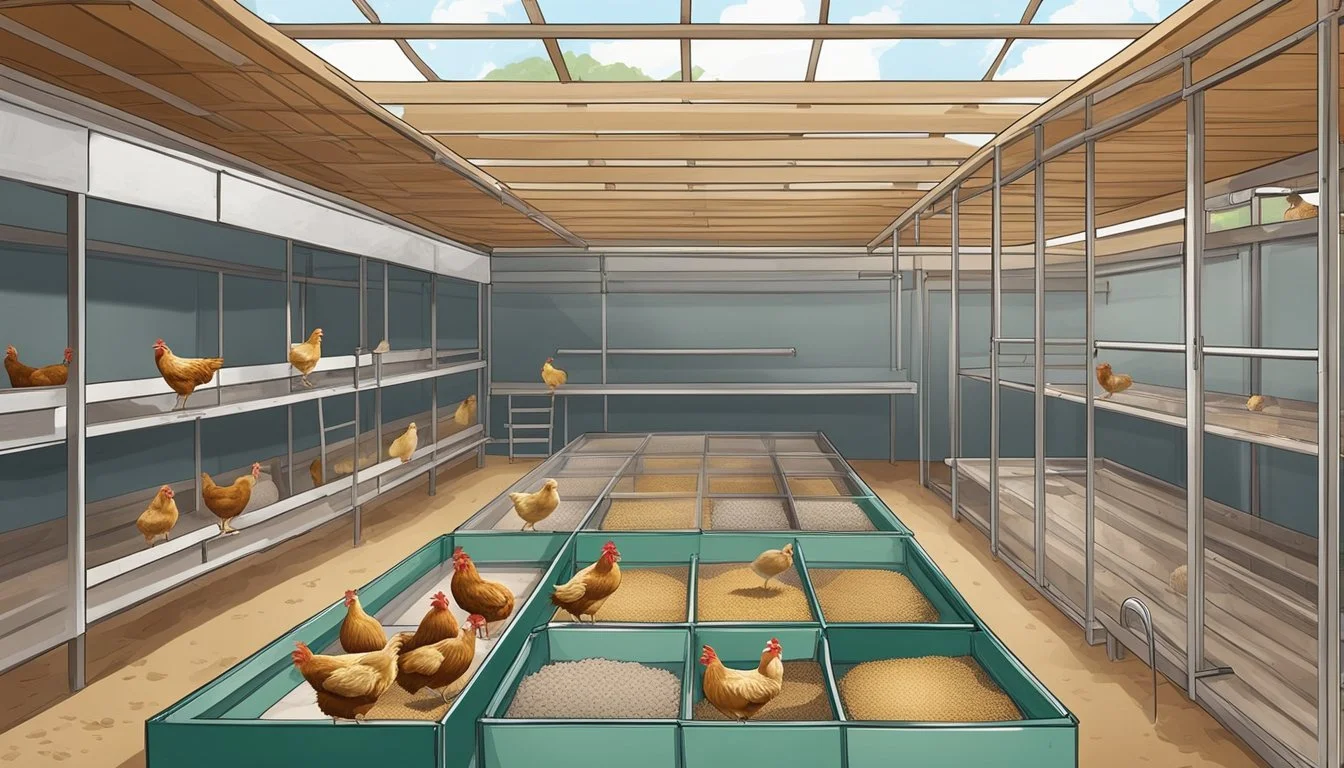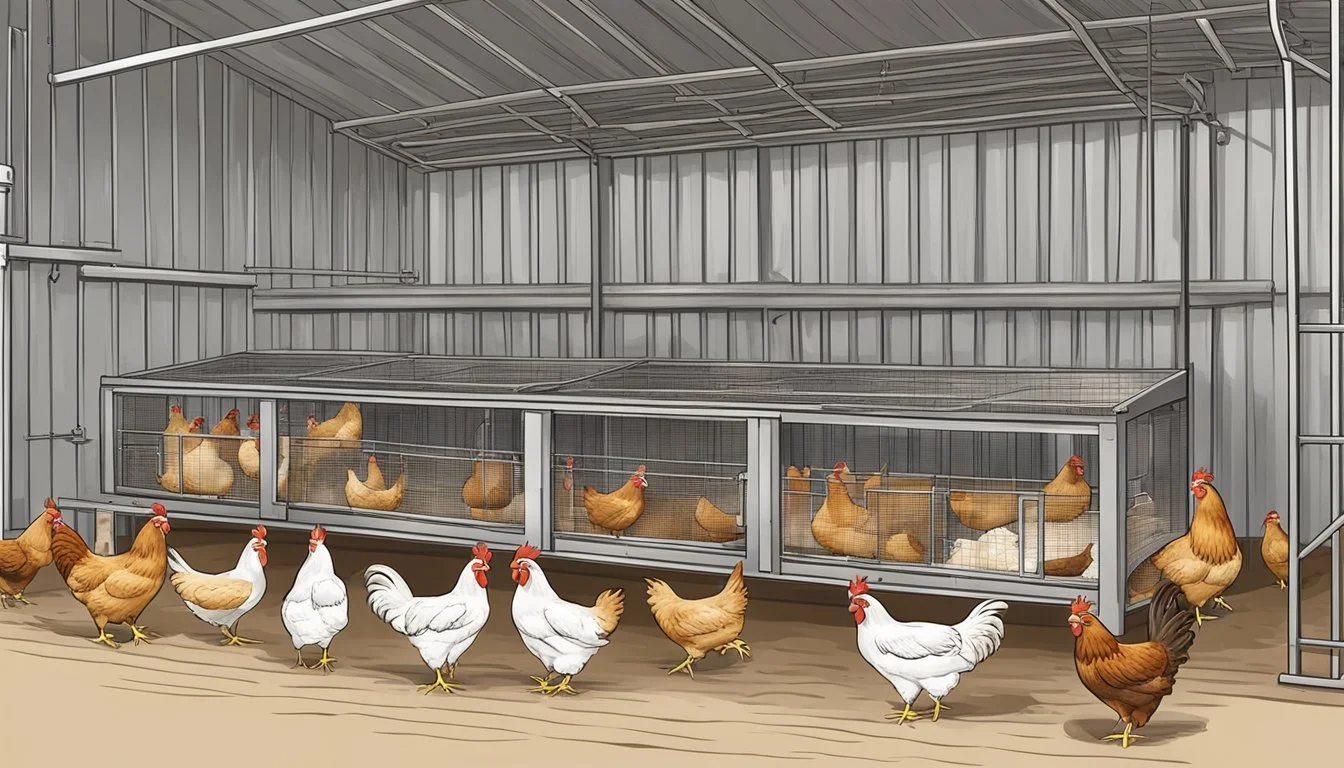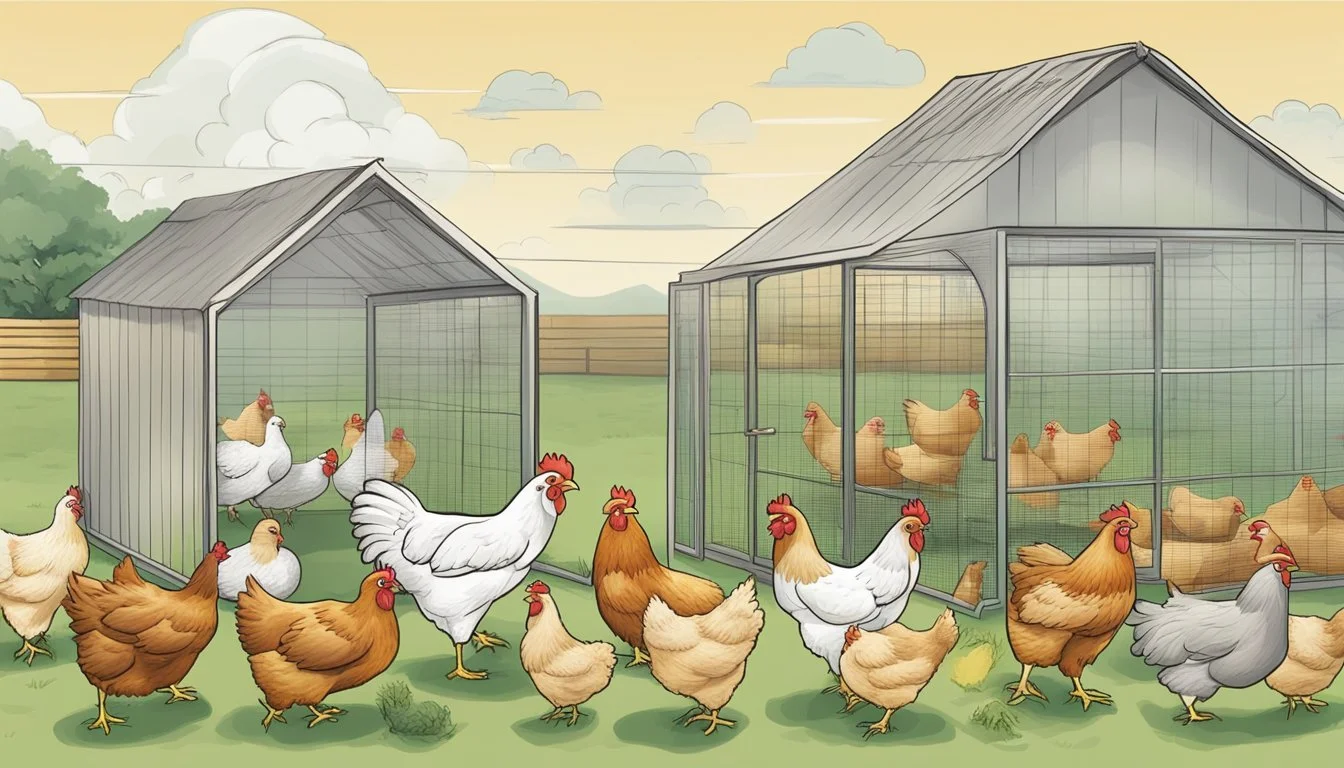What Are the Best Ways to Prevent Parasites in Chickens
Essential Strategies for Healthy Flocks
Chickens, like any other livestock, are susceptible to various parasites, which can significantly impact their health and productivity. These parasites can be broadly categorized into external and internal types, each presenting different challenges to poultry health. External parasites such as mites and lice can cause discomfort and stress, while internal parasites, including various worms, can lead to poor nutrient absorption and severe disease in flocks.
Preventing parasite infestations in chickens is essential for maintaining a healthy and productive flock. Good coop hygiene, regular health check-ups, and effective biosecurity measures are foundational strategies to ward off pests and parasites. Implementing preventative measures such as maintaining clean and dry bedding, performing routine coop cleanings, and providing adequate space can greatly reduce the risk of parasite infestation.
While no single method can guarantee a parasite-free flock, integrating multiple controls such as vaccinating chickens against common diseases and encouraging natural behaviors like dust bathing can create a comprehensive defense. Additionally, it's crucial to be proactive in monitoring for signs of parasites as early detection and treatment can prevent them from becoming a widespread issue in the chicken coop.
Understanding Chicken Parasites
In managing chicken health, understanding the variety of parasites that can affect poultry is paramount. These unwelcome organisms can be external or internal and may cause a myriad of health issues, affecting the overall productivity of a flock.
Types of Parasites
External Parasites: External parasites such as mites, lice, ticks, and fleas can inhabit a chicken's feathers and skin. Mites, for example, are notorious for causing skin irritation and potentially leading to anemia. Lice, meanwhile, are insects that feed on dead skin and feather parts, causing discomfort and stress to the birds.
Internal Parasites: Internal parasites include worms, such as tapeworms, roundworms, and the protozoa responsible for coccidiosis. These parasites live inside the digestive tract or other internal organs, absorbing nutrients vital to the chicken’s health and causing weakness, weight loss, and in severe cases, death.
Life Cycle of Common Parasites
Different parasites have unique life cycles. Mites, for instance, can survive on various surfaces for months, waiting to contact a host. Understanding their life cycle is crucial in targeting the proper stage for effective elimination. A break in the cycle can drastically reduce the population of parasites and prevent future infestations.
Signs and Symptoms of Parasitic Infections
Chickens infested with external parasites may exhibit excessive preening, feather loss, and skin lesions. Lice infestation is often visible under the wings and around the vent area. Internal parasites may be harder to detect, but symptoms often include diarrhea, blood in stools, sudden weight loss, and a drop in egg production, as seen with infections like coccidiosis.
Parasite-Related Diseases in Chickens
Parasitic infections can lead to diseases that may compromise a chicken's immune system. Coccidiosis, caused by protozoa, is one of the most common parasite-related diseases affecting chickens. Prevention methods such as maintaining a clean environment and adopting proper biosecurity measures are key to protecting flocks from these harmful parasites and the diseases they can cause.
Preventative Measures
Preventing parasites in chickens requires diligent efforts focused on sanitation, biosecurity, regular assessments, and proper care. Implementing these strategies diligently can mitigate the risk of parasitic infestations in poultry.
Coop Maintenance and Sanitation
Keeping the coop clean is critical in preventing parasites. Sanitation practices should include regularly removing droppings, changing bedding materials, and performing deep cleans. The coop should be designed to prevent dampness and overcrowding, both of which can promote parasite infestation. Sprinkling diatomaceous earth in the bedding can be beneficial as it naturally helps control external parasites.
Biosecurity Protocols
Implementing strict biosecurity protocols helps prevent the introduction and spread of parasites. This includes controlling access to the poultry area, ensuring that all new birds are vaccinated and from reputable sources, and using footbaths for anyone entering the coop. Isolating new or returning birds before introducing them to the flock can help keep diseases and parasites at bay.
Regular Health Checks
Performing regular health checks on each chicken is essential for early detection of parasites. A veterinarian should be consulted if any signs of infestation or illness are detected. Vaccinations and appropriate treatments, as advised by the veterinarian, should be administered to manage the chicken health effectively.
Proper Nutrition and Care
A well-balanced diet rich in protein and iron is vital for maintaining a chicken’s immune system, making them less susceptible to parasites. Providing facilities for dust baths can also help chickens naturally manage external parasites. Ensuring the chickens have a clean environment and access to nutritious food and clean water is indispensable for their well-being.
Parasite Control Techniques
Effective parasite management in chickens hinges on a twofold approach: targeting the parasites themselves and altering the environment to disrupt their life cycle. Here's how to safeguard your flock against these pesky invaders.
Natural and Chemical Treatments
To combat parasites, a blend of natural and chemical treatments is often necessary. Diatomaceous earth is a natural powder that, when applied to the bedding or dust baths, can effectively kill mites and lice by causing dehydration. Levamisole and piperazine, on the other hand, are chemical dewormers that paralyze worms, while fenbendazole interferes with their energy metabolism, helping to clear infestations.
Natural treatments:
Diatomaceous earth: Apply in dust baths.
Herbal mixtures: Consider herbs reputed for their insect-repelling properties.
Chemical treatments:
Levamisole: Administer as directed for specified parasites.
Piperazine: Use for roundworms.
Fenbendazole: Appropriate for a variety of internal parasites.
Environmental Management
Managing the environment is key to disrupt the development and breeding of parasites. Regular cleaning and disinfecting of the coop with an appropriate disinfectant reduce the parasite load in the birds’ living quarters. Additionally, proper waste management and ventilation can minimize dampness and odors that attract flies and other insects, including mosquitoes, reducing the risk of disease transmission.
Maintaining the coop: Clean and disinfect regularly.
Waste management: Implement proper disposal and composting.
Ventilation: Ensure good air circulation to keep bedding dry.
Quarantine Practices
New introductions to the flock should be quarantined to prevent the spread of parasites. A quarantine period allows for observation and, if necessary, treatment with anti-parasitic medication to ensure that newcomers do not introduce mites, lice, or internal worms to the established flock.
Isolate new birds: Typically, quarantine for at least 30 days.
Observe and treat: During quarantine, check for parasites and treat if needed.
Managing Infestations
Effective management of chicken parasites requires prompt identification and treatment to prevent serious health issues like anemia or paralysis. Regular monitoring and swift action are imperative for the well-being of your flock.
Identifying and Isolating Affected Birds
It is crucial to frequently inspect each chicken for signs of infestation. One should look for lice, mites, and other parasites, particularly around the vent, under the wings, and along the breast. If a bird displays symptoms such as feather loss, skin irritation, or listlessness, it should be isolated immediately to prevent the spread of parasites to the rest of the flock. Isolation also helps in monitoring the affected bird's recovery without risking the health of other chickens.
Treatment Plans and Recovery
Once infestation is confirmed, a treatment plan tailored to the specific parasite should be employed. Products such as insecticidal sprays or dusts are often recommended, but it's important to be aware of any withdrawal period necessary for meat and egg safety if the chickens are part of a production flock. Natural remedies, including diatomaceous earth or garlic solutions, can be supplementary treatments. Alongside treatment, environmental control in the coop and run is essential; this includes thorough cleaning and the use of preventative measures like dust baths. Quarantine new chickens before introducing them to an established flock to prevent potential spread of parasites. Recovery of sick birds should be closely monitored to ensure the return to health and to determine when they can rejoin the main group.
Supporting Chicken Immunity
In managing the health of poultry, bolstering the chickens' immune systems is foundational. A robust immune system not only helps in warding off parasitic infections but also is vital for the longevity and productivity of the flock.
Vaccination and Disease Prevention
To effectively support the immune systems of poultry, vaccination is a critical step. Vaccines help the flock build immunity against specific diseases which could otherwise devastate unvaccinated birds. Diseases such as Marek's disease, a highly contagious viral disease that causes tumors and paralysis, can be mitigated with timely vaccination. Fowl pox, another notable avian disease, presents a threat to chickens but can be effectively managed through proper vaccination protocols.
For respiratory illnesses like Newcastle disease and Infectious bronchitis, which spread rapidly through a flock, vaccines offer a measure of prevention, greatly reducing the incidence. Furthermore, Mycoplasmosis, a bacterial infection that can cause chronic respiratory issues in chickens, is another disease for which vaccination may provide a layer of protection.
It's essential that vaccines are administered correctly and under appropriate schedules to maximize their efficacy. Following the guidelines from experts ensures that chickens maintain a strong line of defense against infectious diseases, contributing to a healthier, more resilient flock.
Monitoring and Responding to Outbreaks
In the domain of poultry health, vigilant monitoring and prompt responses are crucial to thwart the spread of parasites and diseases. Recognizing the signs of an outbreak and seeking expertise from a veterinarian are fundamental steps.
Recognizing Outbreak Signs
Chickens afflicted by parasites may exhibit a range of symptoms such as lethargy, decreased appetite, irregular droppings, and changes in egg production. Pox outbreaks, as a specific chicken disease, can manifest as lesions on the skin or diphtheritic membranes appearing in the throat. Monitoring these signs is critical because early detection allows for timely interventions. It is important for poultry owners to understand the vectors, like mites, ticks, and mosquitoes, which can transmit diseases to the flock.
Collaborating with a Veterinarian
Upon suspecting a disease, immediate consultation with a local veterinarian is vital. They are equipped to diagnose the condition, recommend a course of treatment, and provide advice on biosecurity measures to prevent further infections. A veterinarian can also guide poultry owners on proper vaccination schedules and management practices that reduce the risk of future outbreaks. A professional's assistance ensures that one's response to a disease is both informed and effective, thereby safeguarding the health of the chickens and providing peace of mind to the owner.
Best Practices for Small Flock Owners
For owners of small flocks and backyard chickens, maintaining the health of their birds is paramount. Preventing parasites involves a multi-faceted approach.
Housing: Chicken coops should be kept clean and well-maintained. Regular cleaning of the coop, ideally weekly, reduces the chances of parasite infestation by preventing buildup of feces where parasites commonly thrive. Additionally, they should ensure the coop is spacious enough to prevent overcrowding. Overcrowding not only stresses the birds but also creates an environment conducive to the spread of parasites.
Sanitation:
Clean coops weekly
Change bedding regularly
Remove leftover food to deter rodents
Biosecurity Measures: Flock owners should implement biosecurity measures to minimize disease risks. They can start by preventing contact between their chickens and wild birds, rodents, and insects that can carry diseases and parasites.
Quarantine New Birds: Integrating new birds into a flock poses a risk for parasite transmission. Quarantining new birds for a recommended period before introduction to the flock can help prevent the spread of parasites.
Regular Health Checks: They should inspect their birds routinely for signs of illness or distress which can include decreased egg production or changes in behavior.
Worming: If the flocks are in stationary housing, which is more common for backyard chickens, worming becomes crucial. A veterinarian can recommend appropriate worming schedules and products.
By consistently applying these best practices, small flock owners can effectively manage and prevent parasites in their chickens, ensuring a healthy and productive flock.
Specific Parasite Challenges in Different Regions
The prevalence and impact of parasites on chickens significantly vary from one region to another, largely influenced by climate conditions and habitat. Understanding the regional specifics is crucial in implementing the appropriate preventative measures to combat infestations.
Parasites in Warmer Climates
In warmer regions, the Northern fowl mite and the red mite are prevalent and cause severe problems for poultry operations. These parasites thrive in hotter environments and can lead to anemia and decreased egg production in affected flocks. For example, Texas is known for its warm climate, which presents an optimal environment for the red mite, causing them to reproduce rapidly and become difficult to control.
Prevention Tips:
Regular coop cleanings
Use of acaricides
Maintaining dry bedding
Common Parasites in Colder Areas
Cold areas are not exempt from parasitic challenges, but the types of parasites and their life cycles differ. The European chick flea and the Western chick flea are two examples that can endure colder climates but may have reduced activity during extreme cold. These fleas, including the sticktight flea, can cause irritation, feather loss, and skin damage in chickens, leading to potential secondary infections.
Prevention Tips:
Coop insulation and maintenance
Strategic use of pesticidal dusts
Regular health checks for early detection





